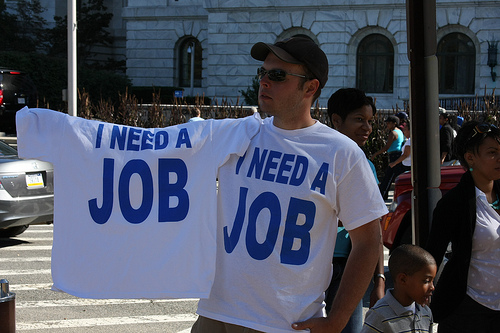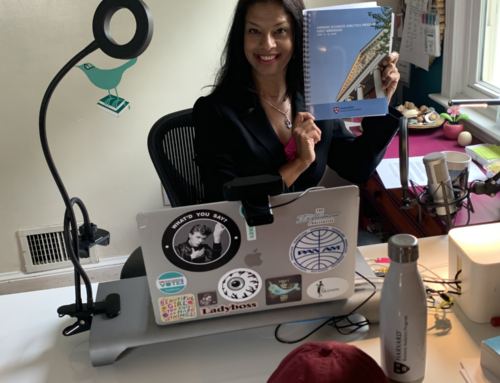This post originally ran on Dec. 2, 2010. Waxing UnLyrical is on its holiday break, so we’re re-running this post since it might still be useful to you. And we hope you had a terrific holiday weekend!
Are you planning to add job seeking to your list of New Year’s resolutions?
I’ve been both sides of the interview table quite a bit.
But probably the time that I did the most interviewing was at my last job.
I was trying to build up a really well-rounded in-house communication team encompassing a range of communication disciplines, both internal and external.
Since said “last job” was for the oldest animal welfare organization in the United States, you’ll understand that we were rarely short of applicants.
Image: Tania Gail via Flickr, Creative Commons
We were deluged by applications; when we had openings, when we didn’t have openings, when we had budget to hire, when we didn’t have budget. It was crazy.
As a result, I learned a few things both about hiring as well as job seeking, that have stayed with me to this day.
Here they are. I hope they are helpful.
1. Don’t try to circumvent HR.
I know that HR, like recruiters, can be the bane of the job seeker’s life (I’ve dealt with some HR professionals over the course of my career I’d be quite pleased never to hear from again).
But the ones who are good, are really really good.
Despite the fact that the application process was clearly outlined on our website (and anywhere else the job descriptions were posted), I can’t tell you how many emails and resumes I received directly from applicants.
Guess what happened to ’em? They got forwarded to HR.
Even the resumes I received from people “who knew someone who knew someone” went to HR.
There is a reason organizations have a hiring process, and it’s usually to make it as efficient as possible. Not to mention the fact that there are certain technicalities about hiring that the VP of a department is not going to be aware of… because that’s not our job.
And it’s HR’s job to help the VP navigate those waters.
So if you’re interested in a job, the first step is to apply following the organization’s process. It shows that you respect the organization’s systems, which is something you’re going to have to be able to live with and adhere to if you get that job.
If you are trying to get an edge and have figured out a connection to the manager of the department in which you hope to work, certainly see if someone can put a word in for you.
But remember that that doesn’t necessarily mean you’re going to skip to the head of the line.
2. Walk the talk.

I kid you not. It was so creative, that I remember it verbatim to this day.
It read:
“I don’t just think out of the box, I set the box on fire.”
Image: Jimmy Cardosi via Flickr, Creative Commons
Can you imagine my face when I saw that? Despite the fact that this person had ignored #1 above, I couldn’t help but be intrigued by someone who had the gumption to write that.
Nothing about skills, work history, or being a fit for the organization, which is what you’d expect to see in a cover letter.
But sass, chutzpah and gumption? Those 14 words clearly had ’em.
So I forwarded the application to HR and, in due time, we called this person in for an interview.
What a disappointment. A very charming person, but one whose creativity didn’t extend to understanding – or explaining – how exactly that creativity would be applied to the job at hand.
Creativity will only get you so far. After that, you have to show you can actually do the job.
Which brings me to my next point.
3. Passion is not the primary factor in making a hiring decision.
If there was a recurring theme among every single person seeking jobs in our department, which was called “Media & Communications,” it was “passion.”
“I love dogs!”
“I have <insert number> rescue(d) cats!”
“Saving animals is my passion!”
The little voice inside me invariably chimed in, “If saving animals is your passion, you’re better off applying to work in one of the departments that works directly with animals, rather than the PR department.”
(No. Of course I didn’t say that out loud. What do you think I am, rude or something?)
Obviously we weren’t going to hire anyone who came up to us and told us they hated animals or would do unmentionable things to them.
But the direct act of saving animals wasn’t our department’s function.
What we did was provide communication support services to help tell the stories of the organization and its many departments, to raise awareness among our stakeholders, and to foster better relationships with those stakeholders that would, in turn, support the organization’s goals and objectives.
Don’t get me wrong; passion is lovely. But don’t confuse passion for the core service of an organization with the experience and skills to do the job at hand.
In my opinion, passion – as the primary qualification for employment – is often overrated.

I can’t tell you how many applications we received from people who were clearly over-qualified for the positions they were applying for.
Or how many applications we received from people who were clearly under-qualified for them. Or not qualified at all (see #3 above).
Most of the time – actually, all the time – these applicants were seeking their “dream job.”
Image: Christine Ward via Flickr, Creative Commons
The over-qualified candidates were usually willing to take pay cuts in order to get their foot in the door. That’s not unusual.
But nine times out of 10, what came across was that they weren’t interested in that specific job so much as just getting their foot in the door.
The under-qualified applicants believed they could make up for that lack with passion. See #3 above. Again.
If we came across someone who was partially qualified, really bright and who we thought could learn the ropes, you bet we tried to give them a shot.
But this was based on them having at least some relevant qualifications and/or experience.
And it was very sad to have to hear the over-qualified applicants try desperately to explain why it didn’t matter they were over-qualified while we knew – from their expressions and body language, though sometimes they were honest to come right out and say so – that it just wouldn’t work.
So think long and hard before pursuing a job that is clearly not a match, whether you’re over- or under-qualified for it. It really doesn’t work in the long run.
5. Don’t piss the hiring manager off.
This seems like a no-brainer, but you’d be amazed at how many candidates I interviewed who apparently couldn’t care less about making a good first impression.
They were so full of themselves, that they started telling me how to do my job.
Never mind the fact that a) it wasn’t the job they were interviewing for (hello!), or b) that if I wasn’t going to be supervising them directly, I’d certainly be managing them indirectly.
It’s quite possible that
you’re smarter than the person you’re being interviewed by;
you’re smarter than a lot of people you might be working with;
and you could, once in, leave everyone else in the dust and rise to the top, no matter how Machiavellian your methods.
But it’s also quite possible that you won’t have a chance to do that… because you were trying so hard to impress the hiring manager, you forgot to be polite… or kept interrupting… or showed impatience at the number of people you’d have to meet…
… or did any number of other silly things.
Of course we all want to be thought of as smart people, and we want to hire smart people.
But we’re not going to hire people whose smartness seems to border on arrogance.
I know it’s tough; you’re so full of nervous energy when you’re in the interview seat that sometimes it comes across the wrong way.
So what I’d suggest is that you practice practice practice being interviewed. Do your homework on the organization, and then grab a friend whose opinion you trust to role play the interviewer.
The more you are put through your paces, the more comfortable you will be leading up to, and during, the interview. And that will help you put your best job-hunting foot forward, without irritating anyone.


![[EVENT]: PR Hacks for Small Biz (online)](https://shonaliburke.com/wp-content/uploads/2021/06/FB-Ad-1200x800-01-01-01-Copy-500x383.jpeg)







What country do you live in?
HR is outsourced, just like most jobs that were previously in the US.
For those high-paying jobs that remain, nepotism and cronyism are rampant and actually facilitated in most cases by social media. Outsourced HR function means immunity from prosecution in this country for EO violations. Discrimination and HR ethics lawsuits are virtually non-existent, and corporate profits are way, way up. There isn’t even a social stigma associated with hiring only friends and relatives in the 21st century workplace.
But who can argue with success? Nepotism and cronyism keeps wealth concentrated in the top 1%. If you don’t like it, the 1% want you to know that you too can be replaced with a relative or a slave, as well as impunity.
@danshawen I live in the US. Perhaps you have encountered nepotism and cronyism and I certainly believe they exist. As far as my experience goes, over the last decade that I’ve lived & worked here, I have not seen any outsourced HR function, and I’ve experienced how maintaining good relationships with HR professionals can help you in your career, sometimes landing a job elsewhere – because they’ve come to know you, and you spring to mind when they hear of openings. I can only write from my experience, after all.
@Shonali@danshawen
Glad to hear your experience has been more positive. In the unemployment line over the last few years, I’ve heard an awful lot of horror stories about this. People who had direct roles in outsourcing jobs were complaining about it, and even changing careers (along with me) because of it. There doesn’t seem to be any improvement in sight.
From the outside of a company looking in, with no contacts on the inside, the view is exactly as I described it. Add 30+ years to your age and the number of active contacts on social media for anyone will be reduced. Add another 10 years and most of your contacts are gone. If everyone on the inside only hire people in their networks, what you get is nepotism, cronyism, and an awful lot of disconnected, permanently unemployed people with no practical means to get suitable employment ever again, regardless of education and/or experience. Not every skilled person “tweets” or is social enough to build a large network of contacts. Who decided that “social” people with more contacts are always the best employees? I know they waste a lot of time in non-productive non-employment related social activities, as evidenced by all the handy tips available about how to hide such communications from employers.
Employment demographics have changed in drastic ways never intended by globalization and the internet, and for the most part, it is not an improvement. Data about this needs to be collected (someone like Hans Rosling, for instance) and disseminated before anything can be done to stop it, but no one seems to be in the slightest bit interested in what social media is actually doing to the workplace. Self-interest and conflicts of interest always trump ethics unless there is actually a consequence for pleading ignorance.
@danshawen I agree that having no contacts inside a company can make things very tough. And I completely agree with you that “social” pepole aren’t necessarily the best employees. The question really should be, are they the best person, based on their skills, experience and abilities, for the job at hand?
I do think that people can continue to develop their contacts, regardless of their age. If they only “network” (I hate that word, but I don’t know what else to use) only with their peers, then yes, as that demographic ages, soon all their contacts will be gone. But if they build and maintain relationships with people over time and of all ages and stages, I think their network will continue to evolve. It won’t be the same as when they started out, but it will be there, and help them when they need it.